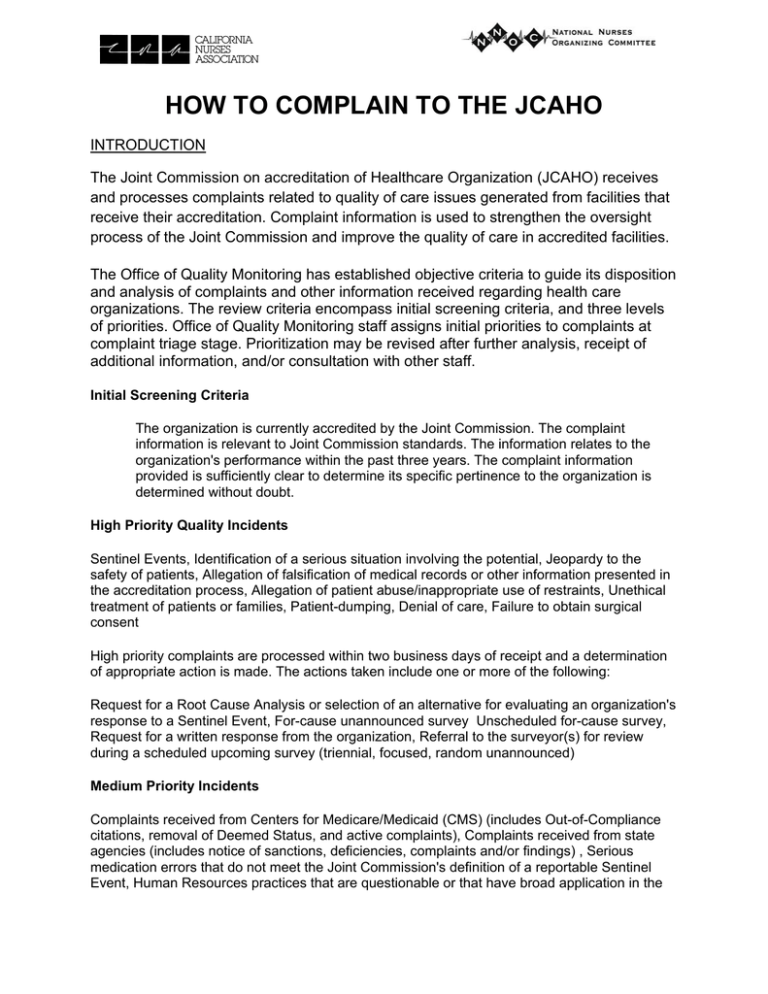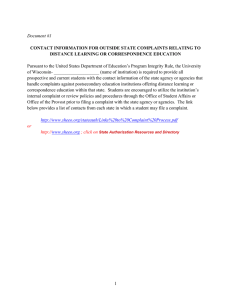how to complain to the jcaho
advertisement

HOW TO COMPLAIN TO THE JCAHO INTRODUCTION The Joint Commission on accreditation of Healthcare Organization (JCAHO) receives and processes complaints related to quality of care issues generated from facilities that receive their accreditation. Complaint information is used to strengthen the oversight process of the Joint Commission and improve the quality of care in accredited facilities. The Office of Quality Monitoring has established objective criteria to guide its disposition and analysis of complaints and other information received regarding health care organizations. The review criteria encompass initial screening criteria, and three levels of priorities. Office of Quality Monitoring staff assigns initial priorities to complaints at complaint triage stage. Prioritization may be revised after further analysis, receipt of additional information, and/or consultation with other staff. Initial Screening Criteria The organization is currently accredited by the Joint Commission. The complaint information is relevant to Joint Commission standards. The information relates to the organization's performance within the past three years. The complaint information provided is sufficiently clear to determine its specific pertinence to the organization is determined without doubt. High Priority Quality Incidents Sentinel Events, Identification of a serious situation involving the potential, Jeopardy to the safety of patients, Allegation of falsification of medical records or other information presented in the accreditation process, Allegation of patient abuse/inappropriate use of restraints, Unethical treatment of patients or families, Patient-dumping, Denial of care, Failure to obtain surgical consent High priority complaints are processed within two business days of receipt and a determination of appropriate action is made. The actions taken include one or more of the following: Request for a Root Cause Analysis or selection of an alternative for evaluating an organization's response to a Sentinel Event, For-cause unannounced survey Unscheduled for-cause survey, Request for a written response from the organization, Referral to the surveyor(s) for review during a scheduled upcoming survey (triennial, focused, random unannounced) Medium Priority Incidents Complaints received from Centers for Medicare/Medicaid (CMS) (includes Out-of-Compliance citations, removal of Deemed Status, and active complaints), Complaints received from state agencies (includes notice of sanctions, deficiencies, complaints and/or findings) , Serious medication errors that do not meet the Joint Commission's definition of a reportable Sentinel Event, Human Resources practices that are questionable or that have broad application in the organization, Questionable staff qualifications, credentials and/or competencies Infection control issues that increase risk to the patient population, Delay in treatment, Apparent significant overuse, misuse or underuse of services, Missed diagnosis or misdiagnosis, Alleged violations of ADA, A series of related low priority complaints These complaints are processed within 10 business days. Occasionally, one of these cases may become a high priority after further analysis or additional information is received, at which time one of the high priority actions may be taken. Medium priority actions include: Request for a written response from the organization, Request for a copy of the Plan of Correction submitted to CMS/or a state agency, Referral to Program staff for further review, Refer to surveyor(s) for review during a scheduled upcoming survey, Review of organization's prior complaint history, Review of most recent survey report Low Priority Incidents General complaints that are vague or lack specifics, but contain sufficient information to determine that they are standards related, Poor service in general terms, i.e., food not satisfactory, rooms not cleaned daily, nurses rushed, rude behavior, communication style, Requests for information, CMS or state "no further action" complaints Because of the importance of all complaints, low priority complaints are acknowledged as having been received and maintained on file, but not pursued actively. As these complaints are reviewed and entered into the Quality Monitoring System, the complaint history is reviewed to assess whether there are related trends. If a pattern is identified, a quality trend flag is indicated. At any time, based on review of the organization's complaint history, further action to review the significance of any complaint or substantiate allegations may be taken. The Joint Commission releases the following information relating to complaints about an accredited or certified organization for the three-year period prior to receipt of the request: 1. The number of standards-related written complaints filed against an accredited or certified organization that has met prospective criteria for review. 2. The applicable primary standards area involved in a specific complaint review. 3. When an unannounced or unscheduled survey is based on information derived from a complaint or public sources, the performance area(s) in which a requirement for improvement was issued will be provided. If an on-site review of a health care organization results in a change of accreditation or certification status or in requirements for improvement, these changes will be reflected in the organization’s publicly available Quality Report. Quality Reports for accredited organizations are available at www.qualitycheck.org, or by calling the Customer Service Center, (630) 792-5800. THE COMPLAINT The public information interview may no longer be scheduled prior to the survey. Individuals reporting a complaint may provide their name and contact information, or may remain anonymous. Providing a name and contact information enables The Joint Commission to inform the individual about the actions taken in response to the complaint, and also allows The Joint Commission to contact them should additional information be needed. It is our policy to treat someone’s name as confidential information and not to disclose it to any other party. However, it may be necessary to share the complaint with the subject organization in the course of a complaint evaluation. In addition, Joint Commission policy forbids accredited or certified organizations from taking retaliatory actions against employees for having reported quality of care concerns to The Joint Commission. Complaints may be reported to The Joint Commission online, by e-mail, fax or regular mail. On-line: www.jointcommission.org/GeneralPublic/Complaint. E-mail: complaint@jointcommission.org Fax: Office of Quality Monitoring, (630) 792-5636 Mail: Office of Quality Monitoring The Joint Commission One Renaissance Blvd. Oakbrook Terrace, IL, 60181 Summarize the issue in no more than two pages and provide the name, street address, city and state of the accredited health care organization. For more information, call The Joint Commission’s toll free complaint hot line, (800) 994-6610, 8:30 a.m. to 5 p.m., Central Time, weekdays.
